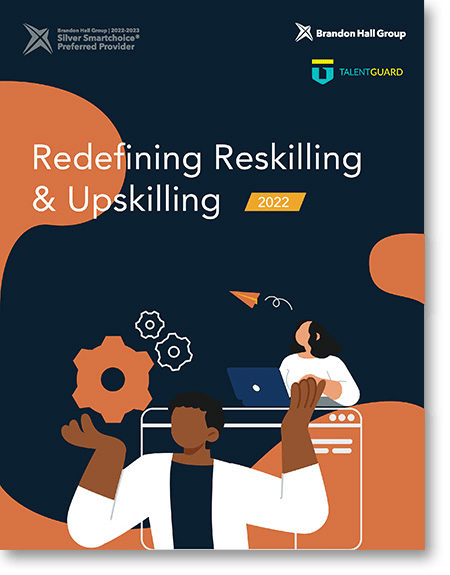What is Upskilling?
eBook: Redefining Reskilling & Upskilling
New research from Brandon Hall Group dives into everything you need to know to better manage and develop your employees skills through reskilling and upskilling. Gain a better understanding of upskilling, the challenges companies may face and more in our eBook, Redefining Reskilling and Upskilling.

Upskilling and Reskilling -- What it means for organizations?
Why is upskilling and why does it matter? They not only help employees become more promotable, but they can help your organization function better with fewer people, too. The recent public health crisis offered many upskilling and reskilling examples and opportunities.
Reskilling became a huge necessity during the height of the COVID-19 pandemic. Only essential employees were permitted to report for work, yet essential companies were tasked with keeping their doors open, regardless. Those few workers who remained had to learn new skills so they could fill the voids left behind. The healthcare industry is a prime example. During COVID-19, nurses and medical personnel had to take on roles they usually didn’t play, including answering phones, scheduling, and performing administrative duties. The upskilling and reskilling of teachers is another good example. Most had to learn new skills in technology in order to move into the role of online instructor. This is one of the digital upskilling examples we saw during pandemic restructuring. Another examples was when restaurants transitioned to drive-thru or delivery only, forcing existing employees to take on new roles such as delivery driver or online order processor.
Because these organizations were able to shift and transform in the face of the pandemic, they were able to survive. The companies who were unsuccessful at embracing this change, or who were unable to successfully reskill their employees, folded.
What is Reskilling?
Reskilling is closely related to upskilling, in that it involves teaching existing employees new skills. However, the objective is different. The reskilling definition refers to reskilling programs that are designed to help employees learn the skills required to make upward or lateral moves within the company. Upskilling and reskilling are not terms that should be used interchangeably, because they each serve a separate purpose. However, both are beneficial to your workforce and to your company.
Companies that promote from within are often the best at reskilling their workforce. And organizations that employ the career lattice, as opposed to the career ladder, often make good use of reskilling, as well. Cross-training employees between departments is a good example of reskilling, because it usually allows the employee to work, one-on-one, with a trainer to learn the methods and techniques required to do the job.
Effective Upskilling Programs
So, if upskilling is such a vital part of a healthy organization, why do some companies fail at its implementation? While it may sound simple, you need a good upskilling strategy to make it work the way it’s designed to work. And the right talent management and reskilling software can prove invaluable. To be successful, your upskilling program must have several elements:
- Concise, measurable goals
- Easy-to-use assessment tools
- Key Performance indicators
- An engaging platform
- Incentive for the employee being upskilled
Most companies who fail at upskilling go at it with a wrong approach. Employees are forced to sit through hours of monotonous training videos or interactive computer modules in order to learn material the company thinks they should know. In reality, upskilling programs like these are generally a waste of time and money. To be memorable, content must be engaging. Employees must have a reason for taking upskilling courses, and it must be something more positive than the threat of corrective action. This is where the right software becomes vital for knowledge upskilling. If members of your workforce clearly understand that upskilling and reskilling will lead to future benefits, including promotion, then you won’t have to threaten them into participation.
How to Upskill Employees
So if, as a personnel manager, you’re still wondering how to upskill employees in a way that’s mutually beneficial to them and to the company, we offer this advice: Utilize a strong talent management software that’s easy to use and provides measureable goals. This type of employee upskilling program will truly prepare workers for the future. And with the continuing drive to move the modern employee online, where they can operate from any location, including home, upskilling and reskilling for a future-ready workforce isn’t just smart. It’s absolutely necessary.
When executed well, the benefits of skill-based learning and upskilling for employees are clear:
- Increased knowledge base
- Improved marketability
- Greater self-esteem
- Increased job satisfaction
For the company, the benefits of a solid upskilling program include:
- Lower turnover rates
- Happier, more future-ready employees
- Increased productivity
- Opportunity to attract top job applicants
If your organization is behind in upskill training for employees, now is your chance to catch up. There’s a lot you can do to introduce the topic, and we suggest beginning with a top-quality AI software that leads you gently forward. Clear goals, measurable progress, and employee incentive: these are the foundation on which you should build your upskilling program. With these three elements in place, your organization and its employees will be ready to face the future head-on.
To learn more about how TalentGuard can help you craft a successful upskilling strategy, request a demo with us today.
Take your company to new heights
Whether your company is grappling with talent management for the first time, looking to modernize outdated tools, or searching for that extra competitive edge, TalentGuard’s Workforce Intelligence Platform can meet you where you are.


Reveal the true nature of your collective talent
TalentGuard’s Workforce Skills Management platform unifies data, software and ecosystem to unlock complete visibility of skills, the intelligence to make data-led talent decisions and the ability to develop the highest potential in your workforce.
Choose Your Starting Point
All three options strengthen clarity across skills, readiness, and talent risk.
The difference is where you start—diagnosing trust, building the foundation, or seeing decisions in action.
Readiness Review
We take a quick look at a small sample of your roles and skills to see where things may be unclear, outdated, or inconsistent. Then we show what “good” looks like using your data as an example. We will share where your data may be breaking down and what needs to be improved to power digital talent management processes effectively.
Skills and Jobs Demo
This is a software-led engagement using TalentGuard’s WorkforceGPT + Intelligent Role Studio (IRS) to create a governed Skills Truth foundation—standardized roles, skills taxonomy, proficiency expectations, and change control—so your job architecture stays current, powers TalentGuard and connects your HR tech ecosystem.
Solution Demo
See how TalentGuard uses governed role and skill standards to power talent assessment, development plan, internal mobility, and succession so decisions are explainable, consistent, and audit-ready. Turn skills truth and readiness into defensible talent decisions.
